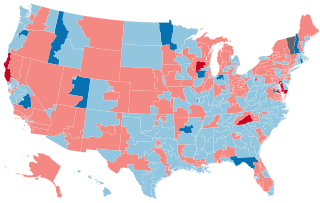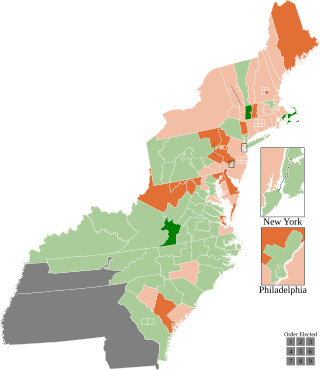A special election was held in New Jersey's at-large congressional district on January 11, 1795, to fill a vacancy in the Third Congress left by the death of Abraham Clark (P) on September 15, 1794.
| Elections in New Jersey |
|---|
 |
A special election was held in New Jersey's at-large congressional district on January 11, 1795, to fill a vacancy in the Third Congress left by the death of Abraham Clark (P) on September 15, 1794.
| Candidate | Party | Votes [1] | Percent |
|---|---|---|---|
| Aaron Kitchell | Pro-Administration | 2,065 | 97.1% |
| Robert Ogden | Unknown | 62 | 2.92% |
Kitchell took his seat in the Congress on January 29, 1795 [2]
The "Republican Revolution", "Revolution of '94", or "Gingrich Revolution" are political slogans that refer to the Republican Party's (GOP) success in the 1994 U.S. mid-term elections, which resulted in a net gain of 54 seats in the House of Representatives, and a pick-up of eight seats in the Senate. It was led by Newt Gingrich.

The 1990 United States House of Representatives elections was an election for the United States House of Representatives on November 6, 1990, to elect members to serve in the 102nd United States Congress. They occurred in the middle of President George H. W. Bush's term. As in most midterm elections, the President's Republican Party lost seats to the Democratic Party, slightly increasing the Democratic majority in the chamber. It was a rare instance, however, in which both major parties lost votes to third parties such as the Libertarian Party as well as independent candidates.
The 1838–39 United States House of Representatives elections were held on various dates in various states between July 2, 1838, and November 5, 1839. Each state set its own date for its elections to the House of Representatives before the first session of the 26th United States Congress convened on December 2, 1839. They occurred during President Martin Van Buren's term. Elections were held for all 242 seats, representing 26 states.
The 1820–21 United States House of Representatives elections were held on various dates in various states between July 3, 1820, and August 10, 1821. Each state set its own date for its elections to the House of Representatives before the first session of the 17th United States Congress convened on December 3, 1821. They coincided with President James Monroe winning reelection unopposed.
The 1814–15 United States House of Representatives elections were held on various dates in various states between April 26, 1814, and August 10, 1815. Each state set its own date for its elections to the House of Representatives before the first session of the 14th United States Congress convened on December 4, 1815. They occurred during President James Madison's second term. Elections were held for all 182 seats, representing 18 states.

The 1812–13 United States House of Representatives elections were held on various dates in various states between August 3, 1812, and April 30, 1813. Each state set its own date for its elections to the House of Representatives before the first session of the 13th United States Congress convened on May 24, 1813. They coincided with James Madison being re-elected president.

The 1810–11 United States House of Representatives elections were held on various dates in various states between April 24, 1810, and August 2, 1811. Each state set its own date for its elections to the House of Representatives before the first session of the 12th United States Congress convened on November 4, 1811. They occurred during President James Madison's first term. Elections were held for all 142 seats, representing 17 states.

The 1802–03 United States House of Representatives elections were held on various dates in various states between April 26, 1802 and December 14, 1803. Each state set its own date for its elections to the House of Representatives, either before or after the first session of the 8th United States Congress convened on October 17, 1803. They occurred during President Thomas Jefferson's first term in office.

The 1800–01 United States House of Representatives elections were held on various dates in various states between April 29, 1800, and August 1, 1801. Each state set its own date for its elections to the House of Representatives before the first session of the 7th United States Congress convened on December 7, 1801. They were held at the same time as the 1800 presidential election, in which Vice President Thomas Jefferson, a Democratic Republican, defeated incumbent President John Adams, a Federalist. Elections were held for all 105 seats, representing 15 states.

The 1798–99 United States House of Representatives elections were held on various dates in various states between April 24, 1798 in New York and August 1, 1799 in Tennessee. Each state set its own date for its elections to the House of Representatives, with some after the official start of the 6th United States Congress on March 4, 1799, but before the start of the first session of this Congress in Philadelphia on December 2, 1799. These elections were held during President John Adams term. It was the last congressional session before the move to the new capital at Washington, D.C. Elections were held for all 106 seats, representing 16 states.

The 1796–97 United States House of Representatives elections took place in the various states took place between August 12, 1796, and October 15, 1797. Each state set its own date for its elections to the House of Representatives. The size of the House increased to 106 seats after Tennessee became the 16th state to join the union. The first session of the 5th United States Congress was convened on May 15, 1797, at the proclamation of the new President of the United States, John Adams. Since Kentucky and Tennessee had not yet voted, they were unrepresented until the second session began on November 13, 1797.

The 1794–95 United States House of Representatives elections were held on various dates in various states between August 25, 1794, and September 5, 1795 (Kentucky). Each state set its own date for its elections to the House of Representatives before the first session of the 4th United States Congress convened on December 7, 1795. They were held during President George Washington's second term. Elections were held for all 105 seats, representing 15 states.

The 1794–95 United States Senate elections were held on various dates in various states. As these U.S. Senate elections were prior to the ratification of the Seventeenth Amendment in 1913, senators were chosen by state legislatures. Senators were elected over a wide range of time throughout 1794 and 1795, and a seat may have been filled months late or remained vacant due to legislative deadlock. In these elections, terms were up for the senators in Class 3.

Donald Milford Payne Jr. was an American politician who was the U.S. representative for New Jersey's 10th congressional district from 2012 until his death in 2024. A member of the Democratic Party, Payne served as president of the Newark city council from 2010 to 2012.

A special election was held in New Jersey's at-large congressional district on March 8, 1808, to fill a vacancy left by the death of Ezra Darby (DR) on January 27, 1808

New Jersey elected its members November 4, 1828.

A special election was held in New Jersey's at-large congressional district on October 8, 1821, to fill a vacancy caused by the death of John Linn (DR) on January 5, 1821, prior to the start of the 17th Congress.

A special election was held in New Jersey's at-large congressional district to fill two vacancies caused by the deaths of George Holcombe (J) on January 14, 1828, and Hedge Thompson (A) on July 23, 1828. The elections were held at the same time as the election for the 21st Congress.

The 2024 United States House of Representatives elections will be held on November 5, 2024, as part of the 2024 United States elections, to elect representatives from all 435 congressional districts across each of the 50 U.S. states, as well as 6 non-voting delegates from the District of Columbia and the inhabited U.S. territories to the United States House of Representatives. Special elections have also been held on various dates in 2024. Numerous other federal, state, and local elections, including the U.S. presidential election and elections to the Senate, will also be held on this date. The winners of this election will serve in the 119th United States Congress, with seats apportioned among the states based on the 2020 United States census.